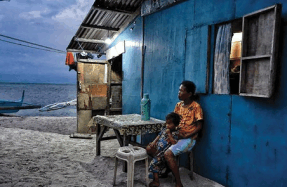HER SWAN SONG


MALKA PUKHRAJ’S MEMOIRS, Song Sung True, begin with the story of her birth, in 1912, in a small village called Hamirpur Sidhar, along the banks of the Chen-ab, at a time when Jammu and Kashmir was still a princely state and British colonisation of the subcontinent was on its last legs.
A celebrated ghazal and folk singer, Malka was employed at the court of Hari Singh, the king of Jammu and Kashmir, when she was only nine years old. After she left his court, she moved to Pakistan, prior to Partition, and settled in Lahore, gave private concerts and began singing for the radio. Like her contemporary Begum Akhtar, Malka made a name for herself as a singer of ghazal, thumri and dadra, as well as folk songs in her native Dogri. She is especially remembered for her rendition of Hafeez Jallandhari’s “Abhi toh main jawan hoon,” but her repertoire was vast, and she had a long and prolific career. She passed away in Lahore, in 2004, but before that, she completed her memoirs, which were edited and translated into English by the historian Saleem Kidwai.
The first person in her cast of characters in the version that was ultimately published in India—and never in Pakistan—is not her family, or even herself, but an old man in her village, a mystic known only as Baba Roti Ram. He is a man of unknown provenance, who nonetheless embodies the syncretism of religion, language and culture that comes to characterise Malka’s own life. Of him, she says, “no one knew who he was, where he had come from, whose son he was, whether he was a Hindu, a Musalman, a Sikh or a Christian.” He is said to possess immense power and prescience. People come to ask him for things and before they can utter a word, he already knows what they want. Malka describes him being as irreverent as they are full of reverence. To a man whose wife has run away, he says, “Am I a pimp or a whore-trader, that I should know about these matters? … Her appetite satisfied, she will be back in a few days. She will return.”
When Roti Ram is in a good mood, he sings couplets composed by the famous saint-poet Kabir, in a voice Malka describes as beautiful. He calls her maternal grandparents, who are Muslim, Gobinda and Parvati. In a land that would, in a few short decades, be riven by the violence of Partition—a land already navigating complex religious conflict and which, to this day, is a site of military siege—Roti Ram’s own cultural ambiguity becomes significant. It is under his shadow that Malka is born, because it is to him that her grandfather rushes when her mother is exhausted from days of labour, with no sign of the baby coming. According to Malka, in response, Roti Ram simply hands her grandfather the pakori he is holding in his hands. “It was nothing but Allah’s grace, for the moment the pakori was put in my mother’s mouth, the worst was over,” she writes. After she is born, she is handed over to Roti Ram, who, though he otherwise speaks Dogri, uses refined Urdu to call her malka-i-muazamma— the great empress—and prophesises that “she will reign one day.”
From before her birth, Malka was a deeply desired and loved child. A childless aunt of hers wanted to call the baby Pukhraj, or topaz, and so the baby is given both names. “This is how I became Malka Pukhraj,” she declares, ending the story of her legendary birth the way that gramophone stars of the early twentieth century screamed their names at the end of the songs they recorded.
The story of her birth reads partly as an apocryphal tale, important not because of the specifics of what may actually have happened in her life, but because it sets a larger context that is a remarkable work of literature that never quite received its due. Cutting through hundreds of years of enforced silence—since courtesan performers’ voices have frequently been erased in favour of narratives about them—and wilful misrepresentation, it candidly presents the voice of a courtesan singer telling her own story.
You’re reading a preview, subscribe to read more.
Start your free 30 days





